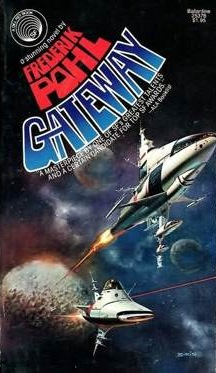Frederik Pohl’s Gateway (1977) is a novel with a fully developed science fictional universe, one that asks lots of fascinating questions, but for once the universe isn’t the main character. What we have here is a character study against a science fiction background. The book begins:
“My name is Robinette Broadhead, in spite of which I am male. My analyst (whom I call Sigfrid von Shrink, though that isn’t his name since being a machine he hasn’t got a name) has a lot of electronic fun with this fact.”
This sets us up as the book alternates between Robin’s psychiatric sessions and the story of his life, and it rocks on what actually happened on his third trip out from Gateway, and whether he should feel guilty about it. It’s interspersed with occasional ads and information that give more world background. The wonderful thing about it is that while it’s a psychological novel in every sense it absolutely needs the set up of the universe to create Rob’s special problems. And it really is a wonderful universe.
Description, but nothing that’s going to spoil your reading experience.
There’s a futuristic dystopic Earth in which the rich live very well and most people live terrible lives mining shale for food or farming kelp. When Venus was being settled, alien ruins were discovered, including a ship that took a prospector to Gateway, an asteroid full of alien ships. The alien ships take people off to alien destinations, and they can find things there that make them very rich. But nobody understands the settings for navigation, so sometimes they don’t come back and sometimes they come back empty. They call the absent aliens the Heechee, and they are very mysterious.
In most science fiction novels, including Pohl’s own sequels, this would be the set-up at the beginning of the book, and the characters would have adventures in which they discovered more about how the world worked, and the world would be changed at the end. Here, this is the background and the story is about how what happened to Robinette on Gateway and on his three trips out changed him. We know from the first page that he went to Gateway and he got rich and he feels guilty, what we slowly find out throughout the book is what happened and why. None of the bigger mysteries are revealed: neither we nor any of the characters knows any more about the Heechee and their mysterious purposes at the end.
If there are only three basic plots, then this one is Aeschylus’s The Eumenides—a man feels guilty and has to go through an ordeal where he’s brought face to face with it and becomes free of his guilt. It’s a surprisingly rare plot; I can’t really think of any other instances of it in genre. I picked up Gateway now because I recently saw a production of the Oresteia and I was thinking about this. Pohl does it very well—especially as Robinette is a bit of a jerk—he’s a coward, he’s in weird denial about his bisexuality, and he really does have something awful to feel guilty about. The pacing of revelation is excellent, and he couldn’t have the problems he does without the experience he’s had.
I didn’t read the sequels and I don’t much like them—all the mysteries get explained, and I liked them better as mysteries. However, as I’ve only read the sequels once each I was surprised how many of the answers to the mysteries I did remember (what the “prayer fans” are, why the seats are that way) which means they have certainly stuck in my mind. But I recommend Gateway as a stand-alone and not as the first of the “Annals of the Heechee.”
The treatment of women is weird. On the one hand, they’re out there on the alien spacestation teaching courses, going out exploring, doing things. On the other Bob sees them entirely in terms of their relationship with him, and most of the ones we see do have relationships with him. I don’t think there’s a named woman in the book he doesn’t have sex with except his mother. Oh, maybe the woman in the unemployment office—good. But Pohl is giving us a really psychologically messed up guy and showing us his therapy. You wouldn’t expect him to be normal. Also, it was 1977 and Pohl grew up in the thirties, so it gets more of a pass.
There’s the usual old computer problems—Sigfrid is self-aware, but he’s a supercooled mainframe. But that doesn’t matter. (I wonder if they will one day be a science fiction retrofuture aesthetic, like steampunk?)
I first read it as a teenager and loved it—for me it was one of the books defining the edges of what SF could do. My son read it when he was fifteen, and his reaction to it was that he loved the setting and wanted to play a role-playing game in it, but he was bored by the psychiatric bits.
It won the Hugo and a huge pile of other awards in 1977, but I think its reputation has suffered somewhat in the time between, largely because of the weakness of the sequels. I can understand people’s desire for more about this world, and goodness knows I bought them and read them, but there wasn’t really anywhere to go from here that could possibly add to Gateway, so I suggest that you read it and then stop—if you want more, read other standalone Pohl.
Jo Walton is a science fiction and fantasy writer. She’s published two poetry collections and nine novels, most recently Among Others, and if you liked this post you will like it. She reads a lot, and blogs about it here regularly. She comes from Wales but lives in Montreal where the food and books are more varied.










